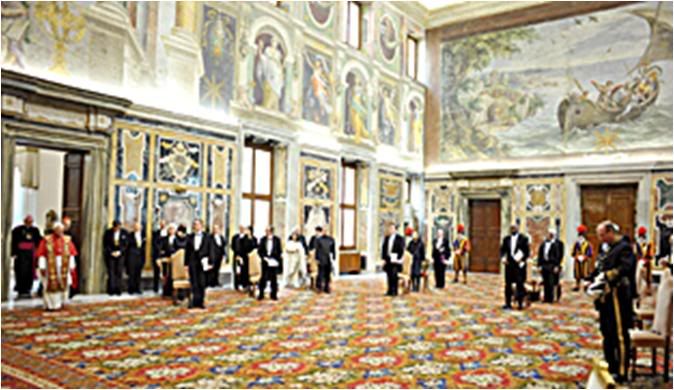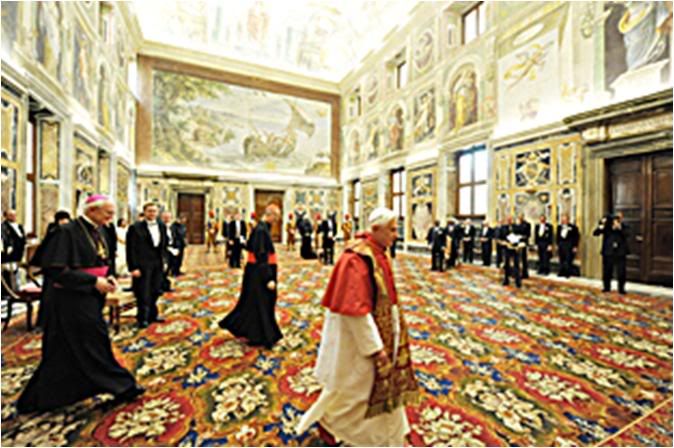 The Pope to 8 new ambassadors:
The Pope to 8 new ambassadors:
Binding international agreements
to protect the environment,
and religions as a force
for peace and reconciliation
Translated from
the 12/18/09 issue of


Receiving eight new ambassadors to the Holy See on Thursday, December 17, the Holy Father expressed the hope for binding international agreements to protect the environment, and said governments must recognize that religions can be a force for peace and reconciliation.
The Pope received the credentials of each of the new ambassadors in formal ceremonies at the Sala Clementina. Cardinal Tarcisio Bertone was also present.
The address that normally the Pope delivers to each ambassador was handed teach of them as documents. The Holy Father then delivered the following address in French to all of them, along with their families and staff members.
Messieurs Ambassadors:
I am happy to welcome you this morning to the Apostolic Palace. You came to present your Letters of Accreditation as ambassadors extraordinary and plenipotentiary of your respective nations: Denmark, Uganda, the Sudan, Kenya, Kazakhstan, Bangladesh, Finland and Latvia.
Welcome all, and please present my cordial greetings to your Chiefs of State and my thanks for the courteous words that you each had the goodness to convey on their behalf.
I express my fervent wishes for the high mission you are undertaking in the service of your respective countries. Likewise, I wish to greet through you the civilian and religious authorities in your countries, and your countrymen. Please assure them of my prayers.
My thoughts go naturally to the Catholic communities present in your countries. You know that they wish to join fraternally tin nation building to which they wich to contribute with all their possibilities.
In my last encyclical, Caritas in veritate, I evoked the necessary restoration of a correct relationship between man and the Creation in which he lives and works. Creation is the precious gift that God in his goodness gave man. They are its administrators and must therefore take on all the consequences of this responsibility.
Man can neither refuse nor escape such responsibility by passing it on to the coming generations. It is also evident that this environmental responsibility cannot be opposed to the urgency of putting an end to the scandals of poverty and hunger.
BOn the contrary, it is no longer possible to dissociate the two realities, because the continual degradation of the environment constitutes a direct threat to man's survival and his development. It also directly threatens peace among persons and peoples.
On the individual as well as the political level, it is necessary to make more decisive and more widely shared commitments with respect to Creation. In this sense, I strongly encourage the authorities of your respective countries, and the community of nations, not simply to strengthen their activities to protect the environment, but also - because the problem cannot be approached solely on the specific level of each nation - to provide forceful initiative and encouragement in order to reach binding international agreements that are both useful and just for everyone.
The challenges which mankind faces today certainly call for a mobilization of man's mind and creativity, an intensification of applied research for a more effective and healthy use of available energy and resources. These efforts cannot be carried out without a conversion or a transformation of the present development model for our societies.
The Church proposes that this profound change that has to be defined and carried out, should be oriented to the ideal of the integral development of the human being.
Indeed, the good of man does not reside in increasingly unbridled consumption and unlimited accumulation of assets - a consumption and accumulation that are restricted to very few but offered as a model for the masses.
In this respect, it does not fall only on the different religions to underscore and defend the primacy of man and his spirit, but also on the State. The latter has the duty to do so through an ambitious policy that favors access of all citizens, equally, to spiritual goods - those that value the richness of social relations and encourage man in his spiritual quest.
Last spring, during my apostolic visit to different countries of the Middle East, I proposed on many occasions to consider religions in general as a 'new start' for peace.
It is true that in history, religions have often been a factor for conflicts. But it is equally true that religions lived according to their profound sense have been and are a force for reconciliation adn peace.
In this historical moment, religions themselves, through sincere and frank dialog, should seek the way of purification in order to conform to their true vocation.
Mankind desires peace, and if possible, universal peace. One must work towards this without utopian visions and without manipulation. We all know that in order to be established, peace requires political, economic, cultural and spiritual conditions.
The peaceful coexistence of different religious traditions in each nation is sometimes difficult. More than just a political problem, this coexistence is also a problem that the religions must face within themselves. Every believer is called on to seek God's will with regard to every human situation.
In recognizing God as the only Creator of man - of all men, whatever their religion, social condition or political opinion - each man must also recognize all others, in their own uniqueness and in their differences.
In the eyes of God, there is no category or hierarchy of man, superior or inferior, dominant or subordinate. For him, there is only man whom he created out of love, and whom he wants to live, in the family and in society, in fraternal harmony.
The discovery of God's wise plan for man will lead him to recognize God's love. For the man of faith or the man of good will, the resolution of human conflicts, like the delicate living together of different religions, can be transformed into human coexistence within an order of goodness and wisdom that has its origin and its dynamism in God.
This coexistence, with respect for the nature of things and the inherent wisdom that comes from God - tranquilitas ordinis, an order of tranquility - is called peace.
Inter-religious dialog brings its specific contribution to this slow genesis which defies immediate human interests, political as well as economic. It is sometimes difficult for the political and economic world to give man first place. It is still difficult for this world to consider and acknowledge the importance and the need for religion and to assure religion its true nature and place in the public arena.
Peace, which is so desired, can only be born from the conjoined action of the individual, who discovers his true nature in God, and those who govern civilian and religious societies, and who, respecting the dignity and the faith of each person, shall give religion is noble and authentic role in the completion and perfection of the human being.
This has to do with a global recomposition, both temporal and spiritual, which will allow a new start towards the peace that God desires to be universal.
Messieurs Ambassadors, your mission to the Holy See has begun. Among my co-workers, you will find all the support that you will need for its successful accomplishment.
Once more, I renew my most cordial wishes for the excellent success of your sensitive mission. May the Almighty sustain and accompany you, those dear to you, your co-workers and all your countrymen. May God grant you the abundance of his blessings!
 I can't ezplain the OR editor's choice for pictures to accompany this article. They are not just poorly resolved; there is nothing to recommend them in terms of composition, compactness, or adequacy to portray the occasion they are supposed to present.
I can't ezplain the OR editor's choice for pictures to accompany this article. They are not just poorly resolved; there is nothing to recommend them in terms of composition, compactness, or adequacy to portray the occasion they are supposed to present.
[Modificato da TERESA BENEDETTA 18/12/2009 00:17]